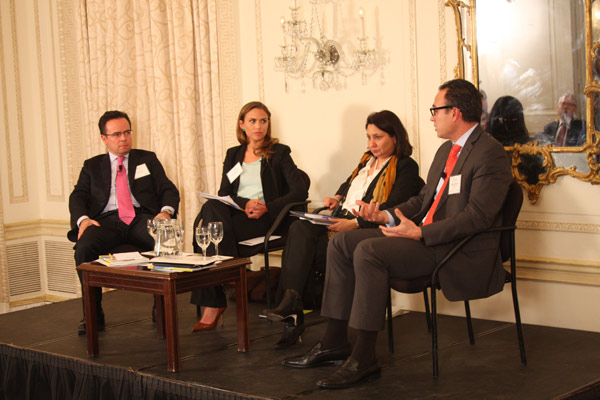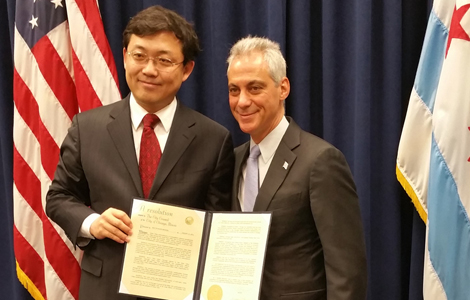Mexico’s economy faces headwinds: Panel
Updated: 2015-02-02 05:37
By JACK FREIFELDER in New York (China Daily Latin America)
|
||||||||
 |
|
Gerardo Rodriguez (right, gesturing), managing director of Emerging Markets Strategy at global investment firm BlackRock Inc, addresses a question during a roundtable on Mexico's 2015 economic outlook on Thursday at the Americas Society/Council of the Americas in New York. Rodriguez was joined by: (from left) Alonso Cervera, a managing director with Credit Suisse's Emerging Markets Economics Research group, Katia Porzecanski, an emerging markets reporter covering the Americas for Bloomberg News, and Shelly Shetty, senior director and head of Latin American Sovereigns at Fitch Ratings Inc. JACK FREIFELDER / CHINA DAILY |
Mexico's economy in 2015 faces pressure from a variety of sources, including low global oil prices, depreciation of the country's currency and an uncertain landscape for foreign direct investment, according to US-based Latin American experts.
Mexico's prospects for growth are based on external factors, so it's not just a matter of importing and implementing, said Gerardo Rodriguez, managing director of Emerging Markets Strategy at New York-based global investment firm BlackRock Inc, during a roundtable on Mexico's economic outlook at the Americas Society/Council of the Americas in New York on Jan 29.
"There is a much more complex process of absorbing something to make it part of your base of capital," said Rodriguez.
Shelly Shetty, senior director and head of Latin American Sovereigns at Fitch Ratings Inc, said at the same event that Mexico has faced a very diverse changing global market, which has impacted domestic growth.
"Mexico is a very diversified economy, but the thing to look forward for this year is really what kind of fiscal actions are actually taking place given the low oil market we are in," Shetty said. "When we take these things in context and look ahead, low oil prices are obviously going to impact Mexico directly in terms of GDP. But it means a fiscal response. How that is calibrated could determine growth rates in the coming year."
On Jan 19, the International Monetary Fund (IMF) released its January 2015 World Economic Outlook (WEO) report, which lowered the global economic growth forecast for 2015 and 2016. IMF projections see the world economy expanding by 3.5 percent in 2015 and 3.7 percent in 2016, picking up from a 3.3 percent growth figure in 2014.
Growth in China, the world's second-largest economy, is expected to slow further to 6.8 percent in 2015 as its economy reorients toward consumption and away from investment, the IMF said.
The United States is the only major country to have its growth forecast raised by the IMF's 2015 outlook report. It put the 2015 growth estimate at 3.6 percent, up from October's forecast of 3.1 percent.
Mexico saw its growth forecast for 2015 drop from 3.5 percent in October to 3.2 percent in the Jan 20 report.
Shetty and Rodriguez were joined by Alonso Cervera, a managing director with Credit Suisse's Emerging Markets Economics Research group.
Cervera said changes in the Mexican government and the implementation of specific energy reform policies are some of "many factors" that explain why Mexico's growth in recent years has been below expectations.
"What we've heard repeatedly over the last few months is that foreign companies were excited about Mexico opening up the energy sector," Cervera said during the discussion. "I'd expect interest from investors in the energy sector to remain fairly in place, but it's disappointing that oil prices have collapsed.
On Aug 11, Mexican President Enrique Pena Nieto signed into law legislation that will open its oil and natural gas markets to foreign direct investment. The new laws govern changes in areas such as energy regulation, tax policy, concessions and joint ventures.
"Prior to the collapse in oil prices, the consensus view was that the energy reform would have the most GDP growth or potential GDP growth," Cervera said. "Now oil prices have collapsed, and we have to scale back our expectations for growth in expected FDI. With oil prices being 50 percent lower, some of these projects no longer seem viable.
"It's been a confluence of events, some domestic, some external, but it's certainly disappointing because there were high expectations," Cervera told the audience at the discussion. "Mexico depends on the US, and the US Economy was doing well."
The US economy is recovering and picking up speed, which could "pull up the economies" that are exposed to international trade, Rodriguez said.
"Outlook over the last few years has given a lot of food for thought," Rodriguez said. "There is a message that perhaps technology may be affecting international trade and how supply chains are assembled much closer to the consumer, which requires a lot less trade for the same amount of GDP growth.
"When the dust settles the world is going to look a lot better, and to the extent that growth looks better, then Mexico measures better," he said. "Lower oil prices would be very good for the global economy, and the drop in oil prices also serves to temper expectations. But I think this is good for Mexico. It's going to require an adjustment for the next few years."
Most Viewed
Editor's Picks

|

|

|

|

|

|
Today's Top News
Jan manufacturing PMI falls to 28-month low
Central China city allows 72-hour visa exemptions
Beijing to build Universal Studios
Head of China Minsheng Bank resigns
78% of China's luxury spending done overseas
Mexico suspends high-speed train project
Alibaba may face class-action suit
MH370 verdict reached
US Weekly

|

|















